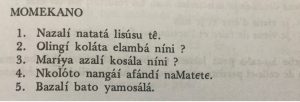Lingala
Practice Reading Text and Comprehension in Lingala
Now that you have had some introductions to vowels, consonants and some tonality in Lingala, let’s go through a short lesson on reading in Lingala. Using a short exercise from the textbook J’apprends Lingala, let’s start our practice/lesson!

For a new language learner, I would always encourage you to try and see if you could guess the meaning of words without relying on a dictionary first. Let’s use the exercise (momekano) above from the textbook to practice reading text and comprehension.
- Momekano (Pronounced as mo-meh-kah-no)
I understand this to mean exercise. To double check my own comprehension, I could rely on the online Lingala dictionary I have been using. Based on these definitions, I can deduce that my guess of momekano is used in the textbook to mean exercise or practice.

2. Nazalí na tatá lisúsu tê (Pronounced as Nah-zah-lee na tah-táh lee-sóu-sou têh)
At my current comprehension level, I understand the sentence to mean – I no longer have a father/I lost my father. How did I get to this translation. I know that:
- Nazali na means I have
- tatá means father
- lisúsu means again
- tê means no but it is used for the negation form here
Put together, this means to me that the sentence says either I no longer have a father/I lost my father.
Let’s assume I did not know the meaning of the sentence at all. If I were to check using a dictionary, here is how I would go about it:
- I would look up the infinitif of the verb nazala which its kozala.

While kozala means to be, you can also notice that there is a verb kozala na which means to have. Changes are that nazali na relates to the verb to have and not the verb to be. If you recall in Lesson 3 we conjugated the verb to be and I also introduced you to the personal pronouns used in Lingala. Based on this, the Na- in nazali refers to the personal pronoun I. -zal- is the root of the verb and –I indicates the present tense we covered in Lesson 3. This results in Nazali na meaning I have.
2. I would look up the word tatá which would mean father or dad amongst other things.


As shown above, lisúsu means again or more and lisúsu tê means not anymore. So can deduce that tê is used to negate the sentence. When I put all this together, the sentence literally translates to:
- I have + a father + not anymore which I would understand to say I do not have a father anymore.
This is pretty close to my initial comprehension or translation without the use of a dictionary so I wasn’t far off. As you will find out, literal translations do not always capture the real sentence structure and meaning but it’s a good place to start as long as you are mindful of this fact.
Practice Time
For the next steps, I would suggest you get a pen and paper and now practice the same logic I used or your own to help you read and understand sentences 2-5 from the textbook (see image below). Give it a shot and let’s see how you do! You go this!

I hope that was not too hard of a task. If it was, no worries. You will get there! Just keep at it. Now that you have attempted working through these on your own, see if you can match the sentences from above in the exercise below.
Resources
- Bwantsa-Kafungu. J’apprends le Lingala tout seule en trois mois. Kinshasa, DRC, pg 23
- Lingala-English Online Dictionary – https://dic.lingala.be/en/

